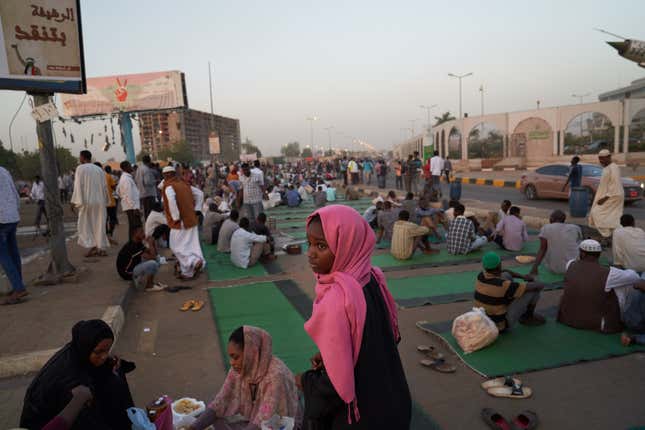
April was a time of hope.
After thirty years in power, Sudanese dictator Omar al-Bashir was ousted by the country’s military, the culmination of months of mass protests.
Images from the demonstrations were shared internationally, including one striking photo of a young woman standing atop a car, her white robe a callback to the clothing worn by women in the ’60s, ’70s, and ’80s, when they marched against military dictatorships. On the streets of the capital, Khartoum, were thousands of protesters. In the wake of al-Bashir’s rule—defined by brute military force and open genocide—pro-democracy activists hoped for a return to a civilian-led government.
Instead, the military commanders who forced al-Bashir to step down have remained in power, and talks between democratic activists and military leaders to transition the government to civilian rule have stalled out as generals now say they won’t hold elections for another nine months. CBS News reports there is growing fear among the Sudanese people that whatever elections the military holds will be neither free nor fair, “and would be orchestrated simply to legitimize the appointment of a new military dictator.”
Then, last week, the military orchestrated a violent crackdown in Khartoum, with paramilitary troops killing and sexually assaulting scores of protesters. In Darfur, where al-Bashir’s troops committed horrific atrocities against Darfuri men, women, and children for years, war crimes are still happening with impunity, Amnesty International warns.
“What we have witnessed in the past three days is horrific and barbaric. The senseless killing of protesters must be stopped immediately, and those responsible for the bloodbath, including at command level, must be held fully accountable for their dreadful actions,” said Amnesty International’s Secretary General Kumi Naidoo in a statement.
Here’s what we know about the crisis in Sudan so far:
- Doctors in Khartoum counted 118 people dead as a result of the military crackdown in the capital on Monday, according to The New York Times. Forty bodies were pulled up from the Nile, and doctors have reported more than 70 cases of rape during the attack. The government has only admitted to 61 deaths and hasn’t even bothered to address the accusations of rape.
- The World Health Organization (pdf) reports that at least 784 people in Khartoum have been wounded in the last week as a result of military confrontations.
- On Sunday, pro-democracy protesters in Khartoum brought the city to a standstill during a general strike (Sunday is the first day of the workweek in Sudan). Multiple outlets report businesses throughout the capital were shuttered, the streets empty and desolate. According to the Times, security forces killed three protesters during the strike.
- NPR is reporting that members of the military have rounded up “essential employees” at gunpoint to force them back to work. Pro-democracy activists have gone underground as they figure out their next steps.
- The driving force of the violence is the Rapid Support Forces (RSF) led by Lt. Gen. Mohamed Hamdan, who’s more commonly known as Hemeti. A paramilitary faction of the Sudanese military, the RSF has been accused of working alongside the “Janjaweed” militia under al-Bashir’s rule, burning villages in Darfur and systematically killing and raping innocent Darfuris in the early 2000s. In recent years, they’ve been accused of continuing chemical attacks and widespread rape in the region.
- A former Janjaweed commander, Hemeti is now considered the most powerful man in Sudan’s capital, the Times reports. Government leaders from Saudi Arabia and the United Arab Emirates appear to be aiding the Sudanese military directly through money and weapons. In May, Hemeti met Saudi crown prince Mohammed bin Salman in Riyadh.
- The government has cut off internet access in the country, making it difficult for protesters to communicate with each other, as well as relay what’s happening in Sudan to the outside world.
The U.S. State Department issued a statement last week condemning the violence and called for a “civilian-led transition that leads to timely elections and free expression of the will of the Sudanese people.”
Assistant Secretary of State for African Affairs Tibor Nagy—America’s top diplomat for the continent—is scheduled to go to Sudan this week, as well as its neighbor, Ethiopia, to try and broker an end to the violence. But as CBS notes, with the might of the Saudis and Emirates behind them, there’s little reason to believe Sudan’s military generals will back down.

